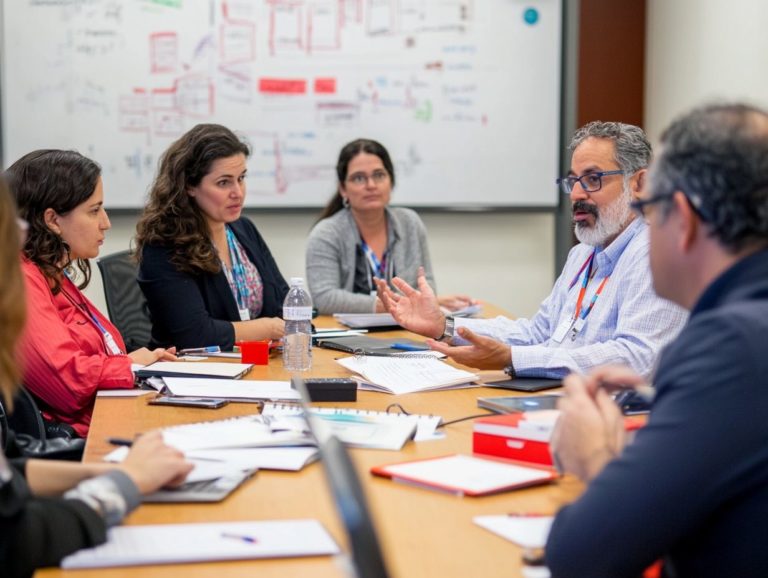What to Include in Your Doctoral Research Proposal
Crafting a doctoral research proposal is a crucial milestone in your academic journey. It sets the foundation for your future research endeavors.
This guide clearly explains the essential components to consider, from formulating a precise research question to detailing your methodology and the anticipated contributions of your work.
You will find valuable tips for structuring your proposal effectively, as well as common pitfalls to steer clear of. Whether you re just beginning or polishing your draft, this article offers the insights necessary to help you create a compelling and impactful proposal.
Contents
- Key Takeaways:
- Components of a Doctoral Research Proposal
- Tips for Writing a Strong Doctoral Research Proposal
- Common Pitfalls to Avoid
- Frequently Asked Questions
- What should be included in the introduction of a doctoral research proposal?
- What components are essential to include in the methodology section of a doctoral research proposal?
- Is it necessary to include a literature review in a doctoral research proposal?
- How important is it to articulate the research questions in a doctoral research proposal?
- Should a doctoral research proposal include a timeline for completion?
- How important is it to consult with your supervisor while drafting a doctoral research proposal?
Key Takeaways:

- Clearly define your research question and objectives to guide your study and demonstrate its significance.
- Conduct a thorough literature review to show your understanding of the research topic and identify gaps in existing knowledge.
- Be intentional about your methodology and expected contributions to ensure your research proposal is well-structured and impactful.
What is a Doctoral Research Proposal?
A Doctoral Research Proposal is your opportunity to lay out a clear and compelling vision for the research project you intend to undertake as part of your PhD. It’s a critical step in the application process, reflecting your grasp of the existing literature while articulating specific research questions that emphasize the significance of your work within the academic community.
This proposal should embody your academic standards and readiness to contribute valuable knowledge to your field, showcasing both the feasibility and relevance of your research.
This document underscores the need for thorough inquiry and places your study within a broader scholarly conversation, highlighting its potential to advance knowledge. Essential elements of your Doctoral Research Proposal include a well-organized structure, typically consisting of an introduction, literature review, methodology, and implications for the field.
Defining clear, researchable questions is crucial, as they serve as the guiding compass for your study. By critically engaging with existing literature, you can build a robust foundation for your research, illustrating how your work will fill gaps or challenge established theories. In doing so, you ll contribute meaningfully to ongoing discussions in your discipline.
Components of a Doctoral Research Proposal
The components of a Doctoral Research Proposal are essential for establishing the framework and foundation of a successful research project. This ensures it meets the highest academic standards.
Include a clear outline of your research methodology, well-defined project objectives, a thorough literature review, and an identification of the research gaps that your proposed study aims to address. Each section must be meticulously crafted to highlight the significance and feasibility of your research.
Such attention contributes to a well-structured proposal that captivates readers and enhances the academic community’s discourse.
Research Question and Objectives
The formulation of clear research questions and objectives is essential for driving the focus of your PhD proposal. They outline the specific aims of your academic research and should align seamlessly with your proposed research to ensure that your objectives are both achievable and relevant.
By defining your research questions clearly, you can effectively communicate the purpose of your project, guiding your research methodology and enhancing the overall coherence of your proposal.
A well-crafted research question serves as a compass for your inquiry and as a bridge connecting theory to practice. For example, consider inquiries like, “How does climate change impact agricultural practices in rural communities?” Such questions reflect the relevance to both your field of study and real-world applications.
These foundational queries inform your project’s design, pushing you to explore existing literature, identify gaps, and establish a strong theoretical framework. In doing so, your research objectives transform into a narrative that propels your academic investigation forward, ensuring that the outcomes will contribute to scholarly discussions while also offering practical solutions to pressing issues.
Start shaping your future research today!
Literature Review
The literature review is an essential element of your doctoral research proposal. It serves to synthesize existing literature and key texts that contextualize your study within the broader academic landscape.
This section illuminates relevant research gaps and establishes your proposal’s academic credibility by showcasing your thorough understanding of prior work in the field.
A well-crafted literature review effectively engages readers and lays the groundwork for justifying the significance of your proposed research.
By critically analyzing previous studies, you can identify seminal works and current trends, helping you position your unique contribution.
Employ systematic methods like keyword searches in academic databases and exploring citation trails to locate pivotal texts that frame your research question.
Addressing research gaps underscores the necessity for your new inquiry and highlights how it can further scholarly conversations.
This exciting process creates a powerful narrative that connects the dots between existing knowledge and the potential impacts of your upcoming research.
Methodology

A robust methodology is the backbone of your doctoral research proposal, clearly explaining the research design and the approach you plan to take for data collection and analysis.
Outline how you will gather primary data and specify the research methods you intend to employ. When your methodology aligns with academic standards, it enhances the credibility of your proposal and showcases your readiness to undertake the research project.
Clearly articulate your research design be it qualitative (focused on understanding experiences), quantitative (focused on numerical data), or mixed methods as each offers distinct advantages in addressing your research questions.
Your data collection methods could involve:
- Surveys
- Interviews
- Observational studies
All tailored to suit the aims of your research. Don’t forget to explicitly detail your analysis techniques, including any statistical tools for quantitative data and thematic analysis for qualitative findings.
This comprehensive approach will strengthen your research framework and ensure that your findings are valid, reliable, and relevant to your field.
In the end, this meticulous attention to detail contributes significantly to the advancement of knowledge.
Expected Contribution
The expected contribution of your doctoral research proposal is where you highlight the significance of your research and its potential impact on the academic community.
Clearly define the research outcomes and demonstrate how they align with your project goals. This showcases the value your study adds to the existing body of knowledge.
By emphasizing its transformative potential, you can bridge gaps within your field and deliver innovative solutions to pressing challenges.
For example, articulating the implications for practitioners can guide their decision-making processes, while providing insights for policymakers can help shape evidence-based regulations.
Presenting a well-rounded perspective ensures that your findings resonate far beyond the confines of academia, fostering a deeper understanding of the topic.
Ultimately, intertwining your research outcomes with clearly defined project objectives cultivates a collaborative atmosphere, encouraging stakeholders to support and engage with your research endeavors.
Tips for Writing a Strong Doctoral Research Proposal
Crafting a strong doctoral research proposal requires you to uphold academic standards while creating a captivating narrative that draws readers in from the very beginning.
To accomplish this, focus on clarity and coherence throughout your proposal. Ensure each section contributes to a well-structured project timeline and aligns seamlessly with the expectations of your PhD program.
By communicating your ideas effectively and employing a polished writing style, you can significantly elevate the impact of your proposal and improve its chances of approval.
Start drafting today to turn your ideas into a compelling proposal!
Structuring and Formatting
Structuring and formatting your doctoral research proposal is crucial for presenting your ideas clearly and in an organized manner. This ensures you meet school requirements.
A well-structured format includes defined sections like the introduction, literature review, methods, and expected contributions. All these components work together to support your project objectives.
By following specific formatting guidelines, you enhance the professionalism of your proposal and capture the reader’s attention more effectively.
Incorporating subheadings within each section adds clarity and makes navigation simple. This allows readers to follow your argument seamlessly. For example, in the literature review, you might use subheadings to highlight key themes or identify gaps in current research.
Consistently applying a chosen formatting style, whether it s APA or MLA, strengthens your proposal s credibility by aligning it with recognized academic practices.
These elements showcase your thoroughness and demonstrate your understanding of the conventions expected in scholarly writing. Ultimately, this creates a more compelling presentation of your ideas.
Incorporating Feedback
Incorporating feedback is essential for refining your doctoral research proposal. This process allows you to engage in critical reflection and improve the overall quality of your submission.
Seek constructive criticism from peers, mentors, or advisors and use their insights to enhance the clarity and effectiveness of your proposal.
By addressing feedback effectively, you can improve your academic CV and increase your chances of a successful PhD admission. Think of feedback as a mirror that reveals blind spots, fostering a deeper understanding of your research objectives.
Organizing brainstorming sessions or using online collaboration tools can help you gather diverse perspectives. Actively integrating this feedback refines your methods and presents your research questions more compellingly.
Reflecting critically sharpens your proposal and helps you identify potential challenges and opportunities. This is crucial when navigating the competitive landscape of PhD admissions.
This continuous cycle of feedback and reflection is instrumental in developing a robust proposal that resonates with selection committees.
Common Pitfalls to Avoid

When crafting your doctoral research proposal, it’s essential to avoid common pitfalls that can undermine the strength and viability of your work. These mistakes often arise during the writing process.
To uphold school requirements, stay vigilant about clarity, coherence, and the appropriateness of your research methods.
By identifying and addressing frequent mistakes, you can save valuable time and pave the way for a smoother journey toward successfully writing your thesis.
Mistakes to Watch Out For
As you prepare your doctoral research proposal, avoid common mistakes. These errors can reduce the quality and effectiveness of your work.
Be aware of issues such as vague research questions, poorly defined project objectives, and insufficient engagement with existing literature. These can seriously detract from your proposal’s credibility and impact.
<pIf your research question is vague, reviewers may question the direction and significance of your study. Similarly, poorly defined objectives can create confusion about what you aim to achieve.
Neglecting to review existing literature can lead to proposals that overlook critical debates or significant findings. This ultimately weakens the foundation of your proposed research.
Such oversights diminish your proposal’s integrity and affect how reviewers perceive your expertise in the field. Ensuring clarity, coherence, and thoroughness in these areas is vital for crafting a compelling and high-quality research proposal.
How to Address Potential Weaknesses
Addressing potential weaknesses in your doctoral research proposal is crucial. It requires thoughtful reflection and proactive feedback.
By identifying areas that may raise concerns, you can refine your approach and enhance the quality of your proposal. This mindset enriches your academic research and shows your commitment to improvement.
Seeking diverse perspectives helps uncover blind spots you might overlook. Engaging with peers, mentors, and experts can provide valuable insights that challenge your assumptions and inspire new solutions.
Incorporating constructive criticism encourages deep exploration of your research questions and methods. This process builds your resilience as a researcher and fosters a culture of academic excellence.
Ultimately, this leads to a more robust proposal that can withstand scrutiny and contribute meaningfully to scholarly dialogue.
Frequently Asked Questions
What should be included in the introduction of a doctoral research proposal?
The introduction should overview your topic, research questions, and the significance of your study. It should establish context and highlight gaps in existing literature that you aim to address.
What components are essential to include in the methodology section of a doctoral research proposal?
The methodology section should detail the research design, participants, data collection methods, and data analysis techniques. Discuss potential ethical considerations and limitations of your chosen research methods.

Is it necessary to include a literature review in a doctoral research proposal?
Yes, a literature review is essential. It demonstrates your knowledge of existing research and supports the need for your study. It should identify gaps in the literature that your research aims to fill.
How important is it to articulate the research questions in a doctoral research proposal?
Clear and specific research questions are crucial. They help focus your study and provide a basis for selecting appropriate research methods and analyzing data. Ensure your research questions are well-defined and align with your objectives.
Should a doctoral research proposal include a timeline for completion?
Including a timeline is highly recommended. It shows careful planning and awareness of the time required for each stage. A timeline also helps manage expectations and demonstrates your commitment to completing the study on time.
How important is it to consult with your supervisor while drafting a doctoral research proposal?
Your supervisor plays a crucial role in developing your proposal. Regular consultation ensures alignment with program requirements and strengthens your proposal through valuable guidance and feedback.
Don’t wait start addressing potential weaknesses today to elevate your proposal!






